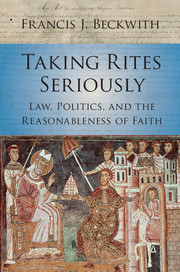Book contents
- Frontmatter
- Dedication
- Contents
- Acknowledgments
- 1 Introduction: Faith Seeking Understanding
- Part I Reason and Motive
- Part II Dignity and Personhood
- Part III Nature and Sex
- 6 How to Be an Anti–Intelligent Design Advocate: Science, Religion, and the Problem of Intelligent Design
- 7 Same-Sex Marriage and Justificatory Liberalism: Religious Liberty, Comprehensive Doctrines, and Public Life
- 8 Conclusion: Taking Rites Seriously
- Index
7 - Same-Sex Marriage and Justificatory Liberalism: Religious Liberty, Comprehensive Doctrines, and Public Life
from Part III - Nature and Sex
Published online by Cambridge University Press: 05 November 2015
- Frontmatter
- Dedication
- Contents
- Acknowledgments
- 1 Introduction: Faith Seeking Understanding
- Part I Reason and Motive
- Part II Dignity and Personhood
- Part III Nature and Sex
- 6 How to Be an Anti–Intelligent Design Advocate: Science, Religion, and the Problem of Intelligent Design
- 7 Same-Sex Marriage and Justificatory Liberalism: Religious Liberty, Comprehensive Doctrines, and Public Life
- 8 Conclusion: Taking Rites Seriously
- Index
Summary
Equal respect for persons requires equal conditions of liberty. But they do not require equal personal approval of all religious practices. Legality is not approval.
Martha Nussbaum (1947–)A tolerant secular community must therefore find its justification for religious freedom in a more basic principle of liberty that generates a more generous conception of the spheres of value in which people must be left free to choose for themselves. It must treat freedom of religion, that is, as one case of a more general right not simply of religious but of ethical freedom.
Ronald M. Dworkin (1931–2013)Now, I'm liberal, but to a degree
I want ev'rybody to be free
But if you think that I'll let Barry Goldwater
Move in next door and marry my daughter
You must think I'm crazy!
Bob Dylan (1941–)Supporters of Justificatory Liberalism (JL) maintain that the state may not coerce its citizens on matters of constitutional essentials unless it can provide public justification that the coerced citizens would be unreasonable in rejecting. According to John Rawls, constitutional essentials include “basic rights and liberties,” such as “[l]iberty of conscience and freedom of association, and the political rights of freedom of speech, voting, and running for office [,which] are characterized in more or less the same manner in all free regimes.” Moreover, because citizens, including religious citizens, have an evidential set – sources of authority, background beliefs and reasons – not shared by their neighbors, they should restrain from employing those sources as the basis for the reasons why they enact laws that limit a constitutionally essential liberty of their fellow citizens who do not share those sources of authority. For this reason, Rawls writes that constitutional essentials are “the special subject of public reason.” As Gerald Gaus puts it: “Imposition on others requires justification; unjustified impositions are unjust … The basic idea is that freedom to live one's own life as one chooses is the benchmark or presumption; departures from that condition – where you demand that another live her life according to your judgments – require additional justification.
- Type
- Chapter
- Information
- Taking Rites SeriouslyLaw, Politics, and the Reasonableness of Faith, pp. 172 - 209Publisher: Cambridge University PressPrint publication year: 2015



